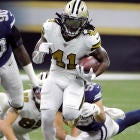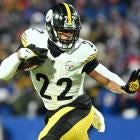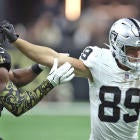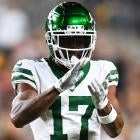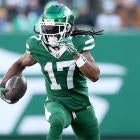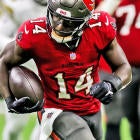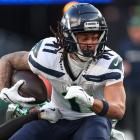If there's one position when preparing for your Fantasy Football drafts ahead of the 2020 NFL season where you probably need an a real plan for, it's running back. Everything else should flow from that. If you're picking in the early part of the first-round, you'll probably need a strategy to build around an elite RB, but that's just one part of the puzzle — once you've got Christian McCaffrey, Saquon Barkley, Ezekiel Elliott, Dalvin Cook or Alvin Kamara, you still have to figure out whether you're taking another running back early or building around the rest of the positions.
And, of course, if you're in the second half of the first round, you've got perhaps an even tougher decision: Take a running back early with some pretty significant question marks — as nearly all of them after the elite tier do — or build around those elite wide receivers and tight ends? And if you do, how late should you wait? Is it worth going for a zero-RB approach this year? In fact, this might be the perfect year for it.
I've taken the biggest questions about the running back position for the 2020 season to our Fantasy Football Today team to see what they have to say. First up, Jamey Eisenberg, Dave Richard, Heath Cummings, and Ben Gretch break down the state of the position and then give their thoughts on Zero-RB, their biggest breakout picks, and more.
1. What is the state of the RB position in 2020?
Jamey Eisenberg: It's good with the chance to be great. The rookie class could swing how successful the running back position is this year, especially if guys like Jonathan Taylor, Cam Akers and D'Andre Swift become stars. And it will be nice if some sleeper options like Antonio Gibson and Joshua Kelley produce in their offenses where there is production to be had.
Dave Richard: It's good, but it's not as deep and rich as every other position in terms of desirable starters in relation to typical starting roster spots. There are about 20 good running backs that Fantasy managers will be pleased to start versus maybe nine tight ends, but you only need one tight end versus at least two running backs in most leagues.
Heath Cummings: Segmented? There's an elite tier of three to five backs and another awesome tier of could-be elite backs that's nearly the same size. After that it kind of depends on what you're looking for. There's no shortage of high-upside backs in the middle rounds, but a lot of them might not get 10 touches in Week 1. There's also plenty of backs like Tarik Cohen and Jordan Howard who are very likely to outperform their ADP but don't get anyone excited.
Ben Gretch: Fantasy's most opportunity-based position is poised to be most impacted by COVID-19. Missed games are more frequent and more defining of a season — we're often hoping high end players just stay healthy, knowing they'll be top-12 backs if they just play 16 games; double-digit round picks can become legitimate stars when the player ahead of them misses time.
2. Is Zero-RB a viable strategy in 2020?
Jamey: Yes, but you have to deal with some ugliness following the draft. You're going to have to feel comfortable with someone like Kareem Hunt, Mark Ingram or Raheem Mostert as your No. 1 running back. And then hope you hit on some guys in timeshares, including veterans fighting for jobs like Marlon Mack, Kerryon Johnson and Darrell Henderson. Remember, you really just need two running backs to have pockets of success during the season if the rest of your lineup is stacked. So if you hit on stud receivers and a great quarterback/tight end combination you could still win your league.
Dave: I won't vouch for it this year. The big-time talent pools at other positions make it easier to find startable players later on Draft Day. Sharp Fantasy drafters know this and instead opt to hammer the running back position early on. So if you're not doing that, you're going to end up with Jordan Howard and Marlon Mack as Week 1 starters. And I guess those two will work as early-season starters, but it sure means you'll have a lot of worry and heartache ahead of yourself as the season rolls on trying to improve upon them. I like Solo-RB better (one running back through the first five or six rounds).
Heath: 100%, but it's definitely not the safe way to go. You can avoid running back for the first six rounds and still land a pair of Week 1 starters in Howard and Cohen. Then you just stockpile upside in backs like Chase Edmonds, Darrell Henderson, Alexander Mattison, and Tony Pollard. If anything, Zero-RB is made more appealing because you can draft three top-12 WR, a top-3 QB and a top 3-TE in the first 5 rounds.
Ben: Zero-RB is a strategy meant not to withstand the chaos of a typical NFL season, but to thrive because of it. All NFL seasons are unpredictable, but 2020 figures to be something else. You don't have to go full Zero-RB, but the strategy is built on limiting the early draft capital spent on the most opportunity-based position and loading up on late-round RB options that could gain substantial value. That's of course a viable strategy ahead of what figures to be the most chaotic season in NFL history.
3. Does your strategy change in PPR vs. non-PPR?
Jamey: Absolutely. It's easier to find flex options at wide receiver in PPR than non-PPR. But I'm much more inclined to give first-round grades to guys like Derrick Henry, Josh Jacobs, Joe Mixon and Nick Chubb in non-PPR leagues given their potential lack of work in the passing game. While I'm hopeful Mixon and Jacobs improve in that area in 2020, they still have to prove it.
Dave: I might be more interested in taking a receiver or tight end in Round 2 or 3 in PPR versus in non-PPR where I am almost certainly kicking off my drafts with two running backs. I know there are fewer running backs I'm comfortable starting in non-PPR.
Heath: I wouldn't really consider zero-RB in non-PPR.
Ben: Yes, I tend to play more PPR, but in non-PPR I'm more likely to grab an extra running back in the first three rounds, and I'm happy to target some backs I like from a talent standpoint but tend to avoid in PPR due to their limited pass-catching roles. Those include Nick Chubb and Josh Jacobs. After the high leverage rounds, though, I still want to wait and load up on high-upside backups after building out other areas of my roster.
4. How important is it for you to have one of the elite backs?
Jamey: While I'm OK taking a Zero-RB approach, I'm more likely to try and get two elite backs this season with my first two picks, especially if I pick toward the back end of Round 1. So I'll gladly draft two of Miles Sanders, Mixon, Jacobs, Kenyan Drake, Austin Ekeler, Henry and Chubb if I pick anywhere from No. 7 on. And that's assuming that Clyde Edwards-Helaire was already drafted in the first six picks.
Dave: No big deal, just league-winning potential with each of them. There are a lot of fun and interesting rushers in Rounds 2 through 5, but maybe one or two of them will actually pan out as top-10 options. The track record specifically for McCaffrey, Barkley, Elliott and Kamara suggest they can almost routinely get 15-plus points in non-PPR and 20-plus in PPR with smash weeks into the 20s and 30s respectively. That'll help put your league rivals away week after week.
Heath: I'm not sure there are enough for me to get a choice. If I have a top-four pick I'm taking one of the four elite backs.
Ben: Well for me, "One of the elite backs" means the first five or so picks, and we can get into trouble projecting the next set of backs to be just behind that elite tier. I love to start a draft with one of those guys, but in the back part of the first round that's not what you're getting, and you're instead passing up an elite WR or elite TE to nab the next tier at RB. I still frequently wind up starting with at least one back in the latter part of the round, but if I've missed out on the highest tier at the position, it's not something I would say is of importance to my roster-building. It might even be an error.
5. How many elite backs are there?
Jamey: I'll go with 13. The cutoff for me is just before Aaron Jones, who I moved back into Round 2 following the lack of offseason work for the rookies, which should hurt A.J. Dillon. If you want to put Jones in that category as a Round 2 pick, fine. But the guys going in Round 3 (James Conner, Todd Gurley, Melvin Gordon, etc.) have too many question marks to qualify as elite.
Dave: Depends on the league scoring. I have eight in my PPR First Tier and ELEVEN in my non-PPR First Tier, but even I will tell you that there's a clear difference between the four names I listed in the paragraph above and guys like Miles Sanders and Joe Mixon. So I'll say four ... and I should probably break up those names in the tiers.
Heath: Four and a half in PPR. Five and a half in non.Dalvin Cook is the half because I'm only 50% sure he'll be available when I need him.
Ben: Five. McCaffrey, Barkley, Kamara, Elliott, Cook.
6. Who has the best chance to join the elite RB?
Jamey: If we're counting Edwards-Helaire, Sanders, Mixon and Jacobs as already being elite then I'll go with another rookie in Taylor. If he can take over as the Colts lead running back early in the season then he has the chance to be special based on what he showed at Wisconsin, as well as playing behind one of the best offensive lines in the NFL.
Dave: The whole reason why Edwards-Helaire is a high first-round pick for me and others is because of the expected opportunity in front of him. He's got a three-down skill-set and will play in an awesome offense that has churned out great running backs in the past (including Kareem Hunt during his rookie year). Best of all, the only possible challengers for his playing time are DeAndre Washington and Darwin Thompson. I'd be shocked if Edwards-Helaire didn't have a big-time role for the Chiefs.
Heath: Sanders and Ekeler. In fact, you could make the argument Ekeler should already be there in PPR. After them, I'd say Chubb and Jacobs, if they could just get another target per game.
Ben: Edwards-Helaire and Sanders are the two I'd argue have the clearest upside outcomes and the best shot to make the jump early in 2020 in large part due to their receiving roles and plus offenses. Drake and ustin Ekeler intrigue me most after that, ahead of Mixon, Chubb, Jacobs, Henry and Jones, but this is where you start to run into legitimate concerns for each and you need to be wary of how good of a player you're forgoing at another position before you take the plunge.
7. Who is your sleeper pick at RB?
Jamey: I was excited the Chargers drafted Kelley this season, and I expect him to take over most of the work vacated by Gordon, which was 204 total touches last year (42 catches). Kelley has to prove he's better than Justin Jackson, but he could be a nice partner with Ekeler and evolve into a low-end starting running back in all leagues.
Dave: I can't stop being excited about Antonio Gibson. He's big, he's strong, he's fast, he's got great receiving skills and he's on a team desperate for playmakers. Oh, and he's a Round 10-plus pick. Gimme.
Heath: Darrell Henderson is still available in Round 9 and he may just be the Week 1 starter for the Rams. Remember, the Rams invested almost as much in him as they did Cam Akers.
Ben: It's hard to land on one sleeper at running back, but later-round players with tantalizing upside should the opportunity materialize include Zack Moss, Chase Edmonds, Boston Scott, Darrynton Evans and AJ Dillon.
8. Who is your biggest bust?
Jamey: I'm fine drafting Henry in non-PPR leagues in Round 1, but I can't take him before the middle of Round 2 at the earliest in PPR. His offensive line likely won't be as good with Jack Conklin gone, there could be wear-and-tear issues after 400 total touches last year (including the playoffs) and he's limited as a receiver. I hate calling him a bust because he's awesome, but I'm not buying him as a first-round pick in PPR.
Dave: I don't have exciting names. Le'Veon Bell, David Johnson and David Montgomery are three guys I don't want to draft. But most people aren't interested in drafting them because they were full of let-downs last year. Montgomery is the one I'm most skeptical of.
Heath: It has to be Jonathan Taylor as long as he's being drafted in Round 3 or Round 4. The Colts are too good a team and have good options at running back already. They can afford to use Taylor as a luxury until he masters all the little things. I expect Mack to be the better Fantasy option for at least the first month.
Ben: I expect Derrick Henry to again be a great runner while healthy, but I don't expect he'll be quite as good as 2019, and he needs to be elite to offset his lack of receiving. Add in the typical RB downside risk, and I also don't expect many Fantasy wins for those who draft Henry in the first round in PPR formats.
![[object Object] Logo](https://sportshub.cbsistatic.com/i/2020/04/22/e9ceb731-8b3f-4c60-98fe-090ab66a2997/screen-shot-2020-04-22-at-11-04-56-am.png)







